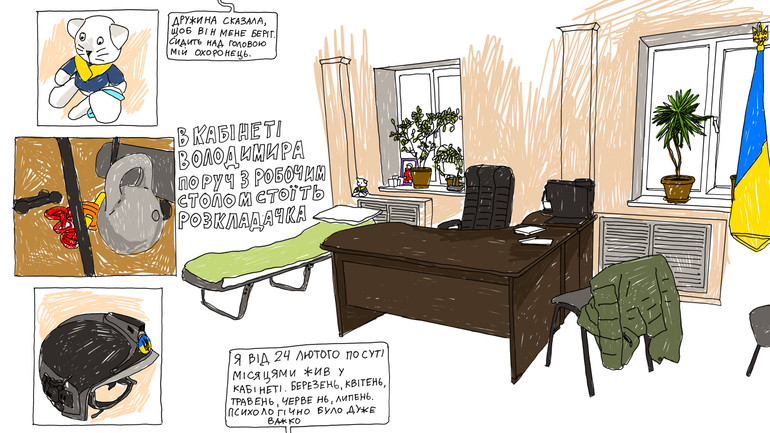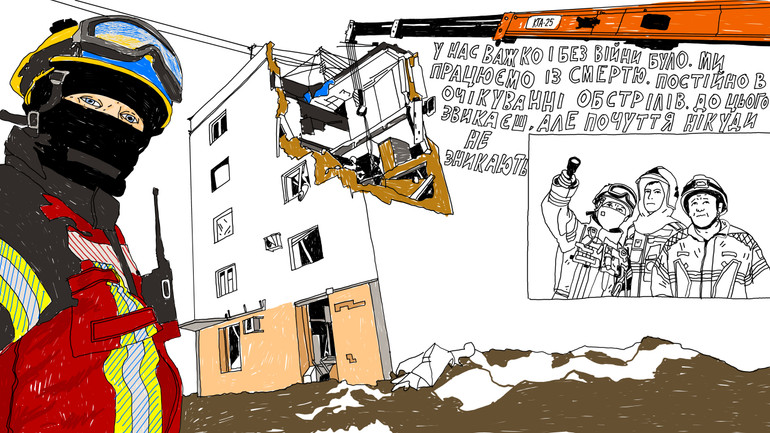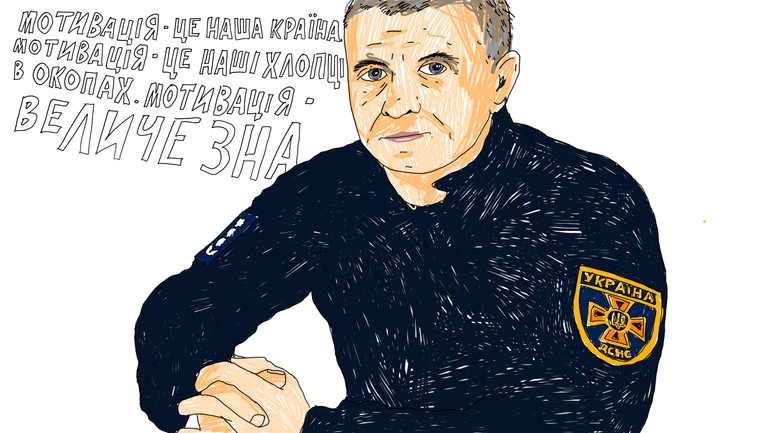What it’s like to be a rescuer. The story of a Kharkiv resident
[ad_1]
Volodymyr Gorbikov. 46 years old. Half of them served in one unit of the State Emergency Service of Kharkiv region. He jokes that even blindfolded he will walk from the subway station to his work.
He started as a guard chief, then headed the 1st Kharkiv State Fire and Rescue Squad. These are 400 subordinates in 7 fire departments.
According to the instructions, his job is mostly to coordinate actions. But the war forced to combine it with demolition of rubble.
After February 24, 2022, Volodymyr and his colleagues got 30 people out from under the ruins of houses. The living And, unfortunately, twice as many dead. He remembers 63 bodies…
The hardest shift, he says, lasted 3 days. 72 hours without stopping, without normal sleep. There were the first missile and air strikes on Kharkov, the Russian military bombarded the city center, Vladimir searched for the living and recovered the dead at each of the destroyed objects.
As a person whose profession is related to rescue, Volodymyr sincerely does not understand the war and how it could be started at all.
Next – Volodymyr’s monologue.
The conversation was recorded on November 9, 2022. Currently, Volodymyr Horbikov works as the acting head of the Kyiv Podil district administration of the State Emergency Service of Ukraine.
Volodymyr Gorbikov
About the most terrible days of spring
March 1 started at 5:00. Russian occupiers hit a school and a residential building. I was in the unit, I left to put out the fire. When he returned, he was again called to the Philharmonic. My 17th unit went there. And I am with them.
Cars near the philharmonic hall were on fire, buildings were damaged. We started extinguishing. Next we see – the roof of the Kharkiv National Opera and Ballet Theater is on fire. They ran there, I with a fire extinguisher from a fire truck.
There were four fires on the roof. And so we partially extinguished them with improvised means, and then stretched the sleeve there and completed the complete extinguishing. Immediately after that, a radio message was sent to all units to go to the Kharkiv Regional State Administration.
They arrived. It was scary…
They ran to the second floor, the higher ones were completely destroyed. There are people under the rubble. A lot of injured.
One boy was being taken out of the room, and the corridor in front of her was completely collapsed. They found a piece of the door and put it as a bridge. Ours got there, put the guy on this shield and slowly handed it over to us. There was an abyss below. It was necessary to hold him.
Then they began to carry out the dead. I clearly remember – 10 dead people were carried out then. There were still people under the rubble.
The siren sounded constantly. Had to hide in a bomb shelter. At some point, I even stopped running there, even though it was dangerous. When it became impossible to dismantle the rubble of the ODA without equipment, we went to a new challenge.
Until mid-August, bodies were still being retrieved from the rubble of the regional administration… I helped pull the girl out… She was 21 years old. The Dnipropetrovsk garrison came to help us then. We still got the guy.
On March 1, I also went to Novobavarsky district. There were, I think, eight dead and 15 or 16 wounded. Two aerial bombs were dropped near a high-rise building. One exploded right next to the house. A woman died there.
The other dead are people who were just walking on the street. The fire was on four entrances, cars were also on fire. People also died in them – those who were driving, those who were in parked cars.
Then at night, a bomb was dropped on Kholodnohirska Street, 3. Then – on the Cadet Corps and the Military Institute of Tank Troops. The houses on the neighboring street were destroyed…
Thus, March 1 turned into March 2, which began with rocket attacks on the building of the National Police, SBU and the Faculty of Economics of Vasyl Karazin Kharkiv National University. In a few hours – the Palace of Labor.
During one of the calls, we rescued a girl from the rubble. They dug a three-meter tunnel to get her. She had a broken pelvis, internal bleeding. The girl died in the hospital. It was the hardest day.
No one understood where the plane would drop the bombs. Airplanes constantly flew over our part. Near the university, substation, train station. We didn’t know when the bombing would end, and the Russians were doing whatever they wanted in the air.
It was difficult.
On March 2, I remember, they found one dead person. His phone kept ringing. I had to answer my relatives.
– He died…
– No, you are mistaken! Maybe he’s still breathing?
– No…
– No!
From that end of the phone, people almost always said, “You’re wrong.”
It is very difficult.
But this guy, as it turned out, accidentally got into that building. He was passing through from Vovchansk, he just went there for a few minutes, and died.
At the beginning of March, the frosts in Kharkiv were down to minus 11. We dug out the dead mostly by hand, because the rubble was so deep that you couldn’t use machinery. In 10 days, 500 cubic meters of concrete were dug up, which is 50 KamAZ trucks. Manually. Only winches will help.
The task was to get people. Our boys, they are heroes. To bear all this, these thoughts, whether there will be another missile attack, shelling, or something will not detonate while extinguishing the fire…
On March 18, I recall, we spent nine hours digging out a man under the rubble at the Institute of Public Administration. There were not very stable communications to put the crane. The tunnel had to be dug by hand.
Do you know how hunting dogs dig up a badger or a fox? That’s the principle with which my Poltava colleague and I dug. I, he I, he Both are low, so it’s convenient. When he was finally pulled out, I couldn’t believe my eyes.
– You again?!
– Do you mean me?
– But we already got you on the second of March!
– Well, yes, I…
– But how much is possible?!
And he was amused then. 9 hours, you can imagine, he was under the rubble for 9 hours. No water, no light. He didn’t know if he would survive.
He was shouting from there, we somehow heard him, but we did not understand where he was. They dug blindly, but still pulled it out. It was a law enforcement officer. Then I jokingly tell his colleague: “Let the man go on vacation, because this is the second time we’re going to dig him up.”
From February 24, I lived in an office for months. March, April, May, June, July… Sometimes I didn’t even know what it was like to sleep at night. In March, I did not sleep for three days. Then you just fall.

Several months after the start of the full-scale invasion, Volodymyr Gorbikov lived in his office
About death and professional deformation
The first death I encountered in my work? She is clouded. But I remember well when we got three children out of a house on Muranova Street. It was January 29, 2010. The parents left the children in the rented apartment, locked the door and left.
The children caused a fire in the kitchen and hid in the closet themselves. When we arrived, the fire was already raging. The temperature was very high. When there is no oxygen, and then it appears, everything instantly ignites. The neighbors said: there is no one at home – the castle. We knocked it down, extinguished it. One of the fighters goes to the closet, but it does not open. He pulled harder, once – and there were three bodies.
The older one is a girl. I pumped her for 20 minutes, tried… And then medical experts said that the children had died before our arrival. And I rocked her dead. I thought I would save…
On February 7, there was a fire call, they said there were children there. We just flew there. They saved two children and pumped them away. They are alive, thank God.
On Nizhnya Giivska, there was another… The home for the elderly burned – 15 people died. It was a state emergency. Such horror had never happened before. Not counting wars.
And during the war, different things happened… On several trips, I simply collected body parts in a bag…
But that’s not how you react to it all. As with doctors, with time and experience, professional deformation occurs. You get used to working with death.
Although feelings do not disappear anywhere. I am a very emotional person. It’s just that we are always close to death anyway. Our boys are dead and injured.
More than once, I and people from my unit came under fire. They came under cluster bombardment several times. Unforgettable feelings, I can tell you. Still young – I want to live…

Rescue workers work with things that people usually do not see in their lives
About motivation and heroism
Somehow we saved the family. The shell destroyed a two-story house, the couple was in bed. We dug them up for several hours.
The woman was still holding on. And I remember telling my husband: “Don’t shout.” And then he constantly saw both his wife and husband in the hospital where he visited my soldier. And so they went every day – thank you and thank you.
But we just work – not for gratitude… And you know – none of the rescued people ever came to us. This happens only in American movies, when the fireman came to the graduation of the girl he saved 10 years ago.
I talked to the guys from the front line. You know, they consider us heroes. I was surprised – because we consider them heroes. My fellow student is now fighting, and he took a picture with me and said that there is no more courageous profession than a rescuer.
In fact, no one wants to glorify their service. We just work. I chose this service. It is not very easy, but no one said it would be easy.
And motivation? Motivation is our country. The motivation is our guys in the trenches. Motivation is huge. I was returning to the warm office, and my uncle was in the trenches somewhere near the border. And there are my friends…
During the war, the lifeguard profession caused a stir in society. Those who were not taken to the army, to the front, looked for themselves and came to us. There was a guy who came in several parts to be able to help. The prestige of the profession will only grow.

“The prestige of the lifeguard profession will only grow,” Volodymyr Gorbikov is convinced
About the family and the dream after the victory
In March, I evacuated my wife from Kharkiv. And my mother and son from the first marriage ended up in the occupation, and it was not clear what happened to them. Mother in Tsirkuny, son – in Lyptsi. It’s hard to remember.
I asked my son to delete my number from the phone. If they saw me in the photo in uniform, they could blackmail me later.
Told him: call me Natalya or Dasha, and call only the landline. He was finding a place from where it could be done. He called and said that everything was fine. Russians came to them once a week or for 10 days. They inspected the house, made sure that no one was hidden.
And my mother… 200 meters from her house there was a weapon that was shelling Kharkiv. I was able to take her out only on May 9. On the 7th, the Russians were knocked out. On the 8th, guys from the reconnaissance group from the Khmelnytskyi region called me. They said everything is fine, mother is alive.
On May 9, at 5 in the morning, I went there. They didn’t want to let me go, it was still dangerous, but I left. There was a dugout not far from my mother’s house, mines were lying around. Took my mother.
For a long time I did not see my son, who went abroad. This is the most difficult. After the victory, we agreed with him, I will come to France, and he will swim across the English Channel, and we will meet there. I hope that my son will continue practicing judo. I would really like him to become an Olympic champion.
The text was prepared by the memorial platform Memorial, which tells the stories of civilians killed by Russia and dead Ukrainian soldiers, especially for the UP. All stories from the cycle “People who work with death” can be read in a separate special project of the Memorial. To report data on Ukraine’s losses, fill out the following forms: for dead military and civilian victims.
Author: Anna Chernenkoandchandelier: Masha Vyshedska, especially for UP. Life
[ad_2]
Original Source Link











